Write Us
We are just a call away
[ LET’S TALK AI ]
X
Discover AI-
Powered Solutions
Get ready to explore cutting-edge AI technologies that can transform your workflow!

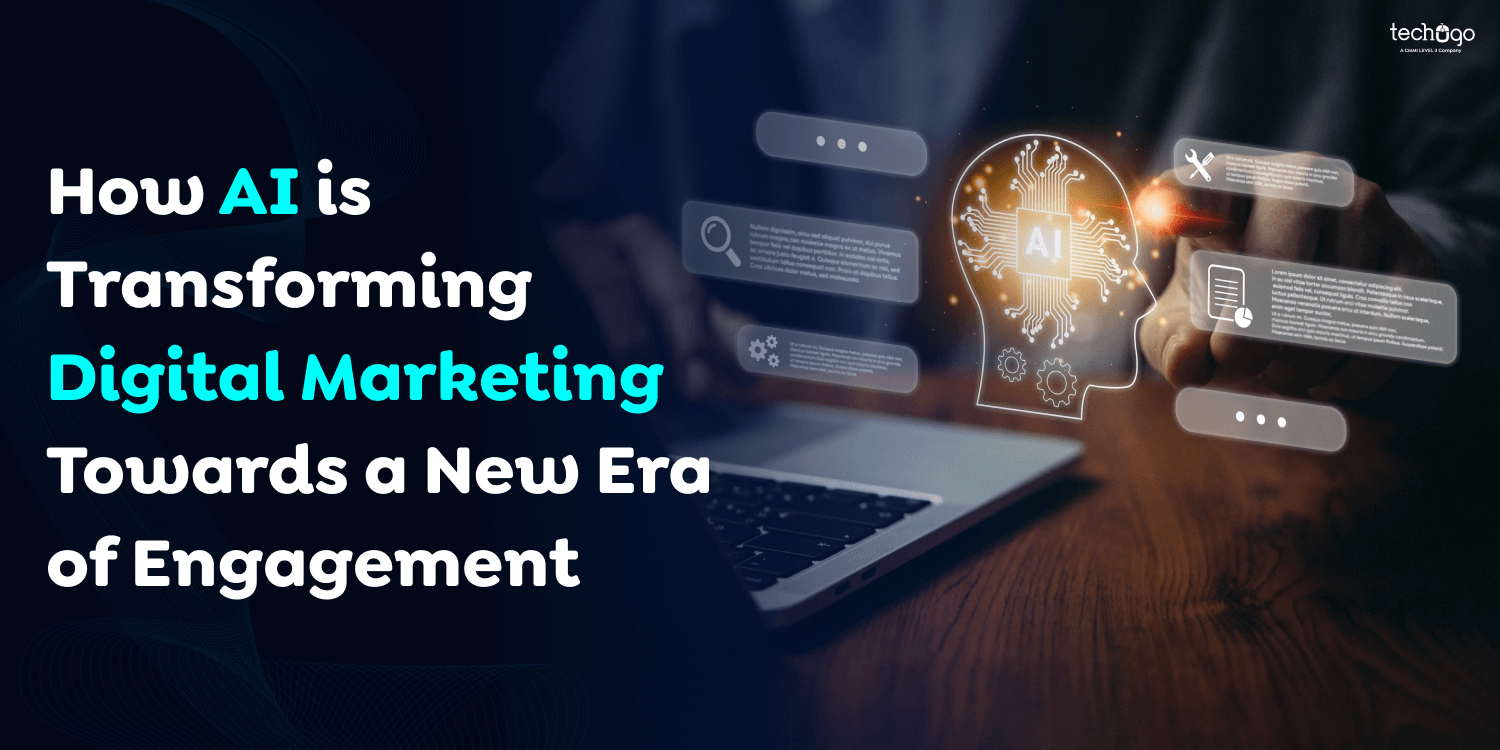
Digital transformation, an essential aspect of business transformations for over a decade, is changing with the advent of AI. AI is on track to fundamentally alter digital transformations, from the goals companies have set to reach to the tools used by practitioners to help advance their initiatives. The scope of work includes traditional AI technologies, including machine learning, and the rapidly expanding field of intelligent AI. The latter is fast becoming popular in enterprise IT projects and corporate tasks, with customer service, software development, and life sciences among the top areas.
There’s no doubt that AI will be a key component of the majority, if not all, of digital transformation projects among IT professionals and managers. It’s just an issue of how AI is transforming digital marketing.
When AI is spoken of in manufacturing and engineering, it’s not a question of machines acting like human beings, but rather advanced algorithms designed to perform a specific job requiring clear inputs. Artificial intelligence explicitly designed for CAD programs, for example, will never be able to think of any “thought” outside those specific established, previously defined specifications.
Unlike conventional automation, AI-powered systems can respond to new information or sudden changes. This is the biggest advantage; predetermined outputs do not confine it. AI algorithms can learn from both success and failure. They can self-correct and analyze the data to identify incoming challenges before they arise.
From a different perspective, automation is a significant investment when used with a previously defined, well-defined process, such as well-established manufacturing lines. The user is always in charge of the automation processes within the constraints of a specific set of inputs. However, AI is the best in attempting to tackle problems that are more complicated or not governed by predefined rules. If the user can provide an AI with an input set and data, the AI will evaluate the information and recommend the best strategy or execute it independently (depending on the specific situation).
How AI is transforming digital marketing in different industries? The effects of AI can be observed in a variety of ways. Here are a few:
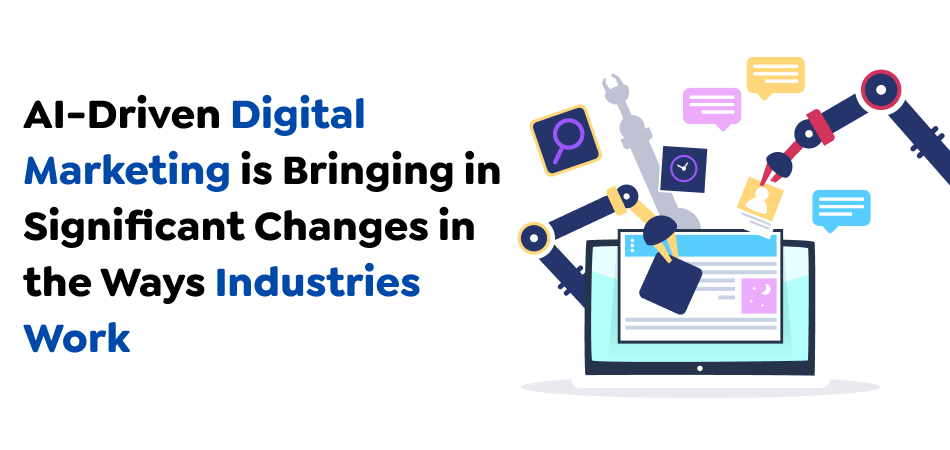
The effectiveness of operations is the main necessity to ensure the longevity of growth for any business. It’s much simpler than it appears, but AI assists in this by automating repetitive tasks, which minimizes human error and also makes it easier to reduce time. The use of AI can cut costs and improve efficiency since it is more accurate and reliable than humans. AI can also provide a more flexible operational framework because it can rapidly and efficiently change the situation.
Another way in which AI transforms digital processes is through the use of AI to improve customer satisfaction. Chatbots are a vital element in transforming customer support capabilities and experiences. Marketing tools based on AI are designed to create customized customer journeys. They analyze customer information to deliver tailored content recommendations and enjoyable experiences alongside other innovative AI technologies that help build customer loyalty and boost engagement. These tools are revolutionizing the way companies communicate with their customers.
Collecting massive quantities of data is a problem, but having access to the variety of information they offer is an entirely different issue. AI-driven data analysis tools allow you to analyze and gather information from various sources while presenting previously unknown data. Thanks to the rapidity of accessing more data, companies will gain a more accurate appreciation of market dynamics and make greater, informed choices.
The marketing strategies of a wide range of sectors have undergone drastic transformations with the advent of AI. From creating content that could be made to better visuals, certain areas of marketing haven’t been transformed or enhanced through AI tools. One of the most effective ways to use AI in digital marketing is through the ability to tailor the experience. For example, tools like AI website builder enable businesses to create personalized, AI-driven websites that cater to individual user needs. AI analyzes customers’ behavior using advanced algorithms to determine preferences and requirements. It can then create personalized content and deliver individual digital experiences and marketing campaigns to target clients based on their personal requirements and needs, resulting in excellent conversion rates.
Each application of artificial intelligence brings many benefits and speeds up a digital transformation that is impossible to achieve with manual approaches. The advantages of utilizing AI for digital transformation include the following:
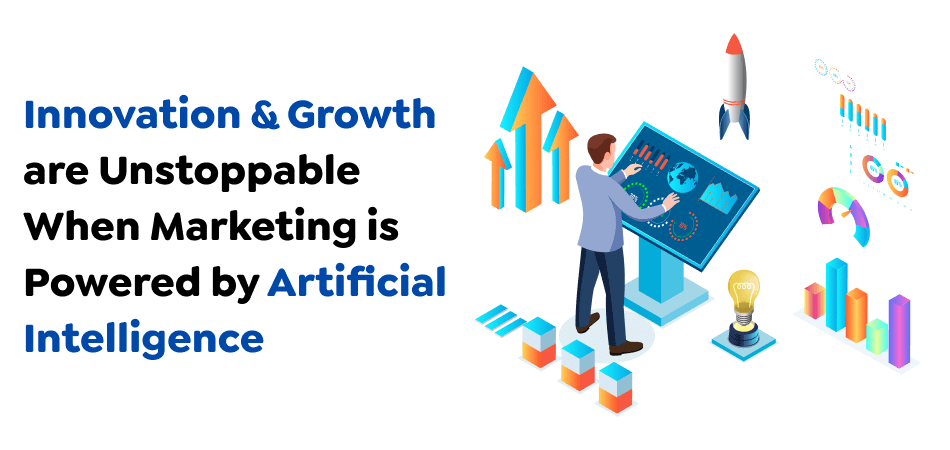
AI automates repetitive everyday tasks that take a lot of time, helps companies optimize their resource use, and boosts efficiency to a greater degree. It improves productivity and lets employees spend their time managing other tasks. Thus, by streamlined or automated workflows, businesses can lower costs, cut resource spending, and increase the efficiency of their operations overall.
Artificial intelligence can provide personal experiences and quick support that help businesses attain high levels of customer satisfaction. By anticipating users’ needs, AI will allow companies to maintain long-term relationships and increase customer loyalty through personalized interactions. AI mobile app development increases customer satisfaction by providing personalized content, navigation, and responsive features adapted to their needs.
AI’s role in the digital transformation process will give companies a competitive edge. AI-driven innovation can allow companies to be agile, creative, and quick in responding to the market and stand out from competitors. In the ever-evolving mobile app development industry, AI-driven features and functions are a great way to make apps stand out in a competitive market. For example, advanced personalized analytics, predictive analytics, and seamless AI integrations will give you an edge over your mobile apps.
It’s one of the main advantages AI can provide to digital transformation. AI-powered mobile apps provide companies with insights based on data to help them make critical strategic decisions that will aid in developing their businesses. With the help of information from multiple sources, companies can identify the possibility of opportunities and assess risks by optimizing their processes. For AI-developing mobile apps, data-driven insights assist developers in understanding user behavior, analyzing their apps’ performance, and making educated decisions about features and updates to come in the near future. This allows them to develop a seamless and innovative mobile app that can efficiently meet the user’s demands.
AI can drive innovations in product designs, business models, and services. It will also allow organizations to identify opportunities, design cutting-edge solutions that add value, and boost growth through the integration of AI technology. AI app development for mobile devices has stood at the top of this technology, and advancements in AI-driven features allow for opportunities for app functionality and interaction.
The path to how AI is transforming digital marketing has numerous obstacles. Integrating AI into infrastructures currently in use by businesses isn’t easy, especially when confronted with the complexity of outdated technology. However, these issues allow companies to develop new ideas, improve efficiency, and gain an edge over their rivals. One method to tackle the obstacles involves bridging the gaps is by using modern technology and AI businesses.
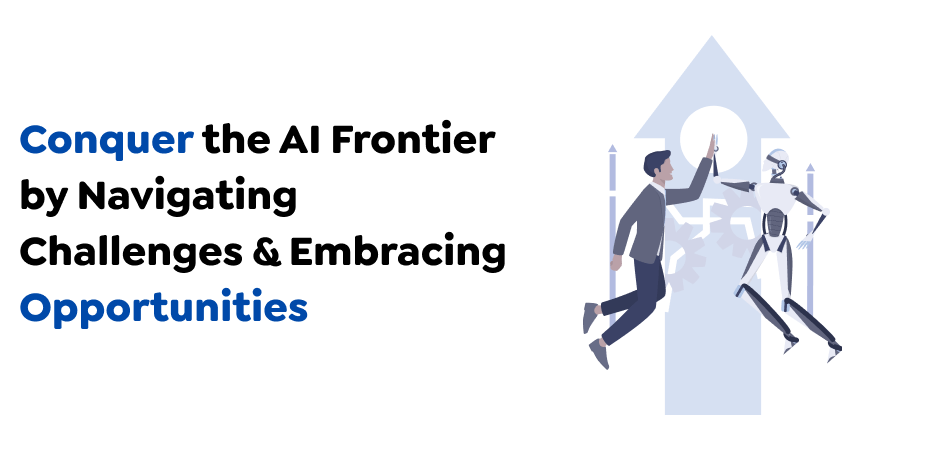
Businesses must be agile and committed to ongoing learning to maximize AI’s potential. Making changes in AI-related workflows, processes, or enhancing employees’ capabilities and ensuring ethical considerations are included in AI deployment. If they do it right and analyze the situation, businesses can gain an advantage over the expense of integration and implementation issues, allowing AI to offer new opportunities for expanding their business and increasing their competitiveness.
A well-trained and educated group of AI experts must navigate the complex waters ahead of AI implementation. The lack of specialists with the appropriate expertise in AI is a significant obstacle for companies looking to build designs, manage, and design this latest technology. The learning curve associated with AI is long and requires substantial resources to educate and make ad-hoc adjustments. To fill in the gaps in understanding, businesses are making alliances with AI-focused firms and schools and ensuring that they have the technical knowledge needed to take advantage of AI’s best capabilities.
An active approach is required to tackle ethical issues resulting from AI use. Here are a few steps that businesses could consider:
Following these steps, companies can reduce implementation costs and incorporate AI into their processes:
How AI is transforming digital marketing? Continuous learning has become the driving force behind growing technology. By permitting AI to grow continuously, AI remains adaptable and capable of responding to the ever-growing volume of data available, making predictions, and generating patterns. The advantages of this are evident in the rapidly changing fields of healthcare and cybersecurity, in which the ability to adapt is an indicator of effectiveness.
However, continuous learning comes with difficulties. The cost and complexity caused by the constant adaptation of data can be substantial, and navigating through a growing variety of models to find the most effective one can be an enormous task. Yet, despite all these issues, it’s a possibility worth considering as it guarantees that AI stays ahead of the technological curve, providing superior predictive capabilities while retaining its importance in a constantly evolving world.
After discussing the benefits of implementing AI in the business world and the most significant technology that can support this approach, we can now start taking action. It is essential to understand that the AI transformation of your business is a continuous process that requires planning and an order of operations to ensure maximum efficiency. Don’t get overwhelmed. In this section, we’ll guide you through each step of this process and provide the most significant aspects.
When doing this, it is crucial to remember that each project’s use case and solution will be different and will have guidelines specific to the project. This is why we have given the general guidelines for successful AI implementation.
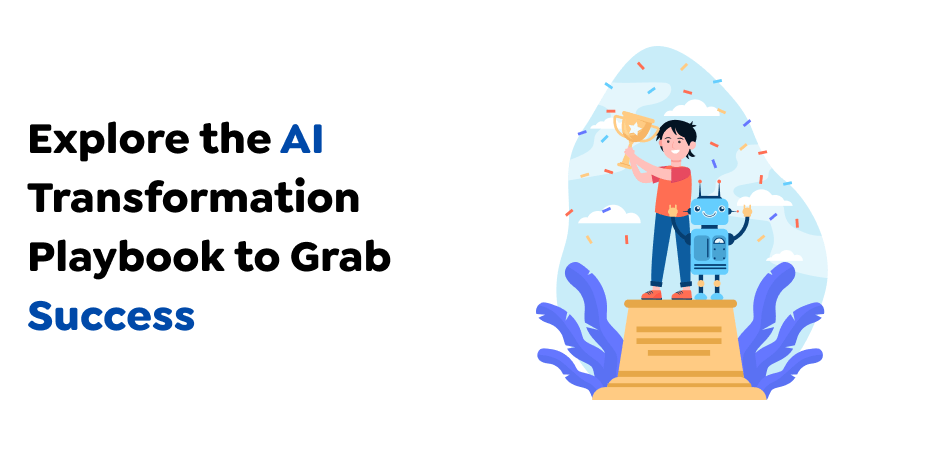
Based on our AI research and development experience and the top methods outlined by an AI app development company, we suggest the most effective action plan to ensure the success of AI implementation. Let’s take a look at the process that will help us achieve the digital revolution using AI step-by-step.
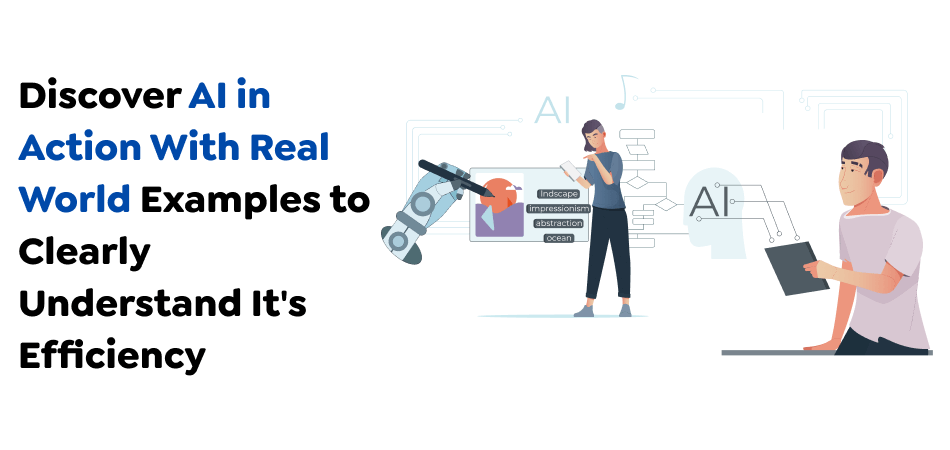
AI is an important tool that can help businesses gain operational insight, which can streamline workflows and improve processes. In addition to providing details, AI can have other practical applications in real-world situations. Here are some examples of how AI can be utilized in real-life:
Speech recognition is an essential component of many AI applications. Using speech recognition, AI computer systems, and applications, they can “understand” human speech and transform it into text to facilitate voice searches or make information more precise.
Utilizing AI algorithms to analyze patterns in consumer behavior and trends can help businesses design more effective strategies. The data can then be used to offer more relevant and helpful recommendations to their customers.
One way AI transforms customer service is by using chatbots, also called virtual assistants. These AI-powered devices enable customers to respond to queries quickly, offer personalized recommendations, and answer customers’ frequently asked concerns (FAQs) without the need for human intervention.
AI technology is now extensively utilized to improve the healthcare industry. For instance, healthcare professionals utilize AI analytics tools to help medical professionals determine the likelihood that patients will require surgery, reducing the chance of having surgery and eliminating unnecessary procedures from the procedure. Beyond the ability to predict with AI machines, their machine-learning capabilities aid medical professionals in detecting and taking preventative steps to combat illnesses. Furthermore, AI-powered healthcare software will help patients’ treatment, for instance, by sending patients notifications about medications, allowing patients to be more aware of their health.
AI has also proven to be a vital tool in manufacturing. For example, inventory management systems can use artificial intelligence to enhance processes and eliminate human errors. AI’s advanced analytical capabilities can be helpful for companies trying to convert their businesses to digital by helping them reduce risk, analyze information, and make better choices more quickly.
Using AI to transform digitally isn’t just something that can be done in a single moment but an ongoing and continuous process. This requires a clear plan of action, a strategy, a mobile app development company in USA, and a positive environment. Here are a few steps to help you implement AI to help you succeed in digital transformation:
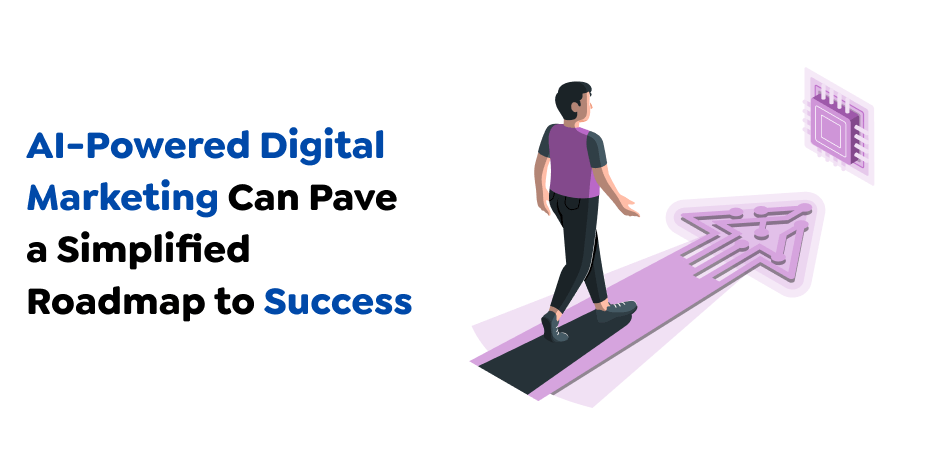
To illustrate how these steps can be implemented in the real world, here are some examples and successful stories from companies that have utilized AI to create digital transformation:
These are only a few examples of how companies have utilized AI to bring about digital transformation. Adhering to the guidelines and best practices described in this document and effectively implementing AI to help with digital transformation is crucial.
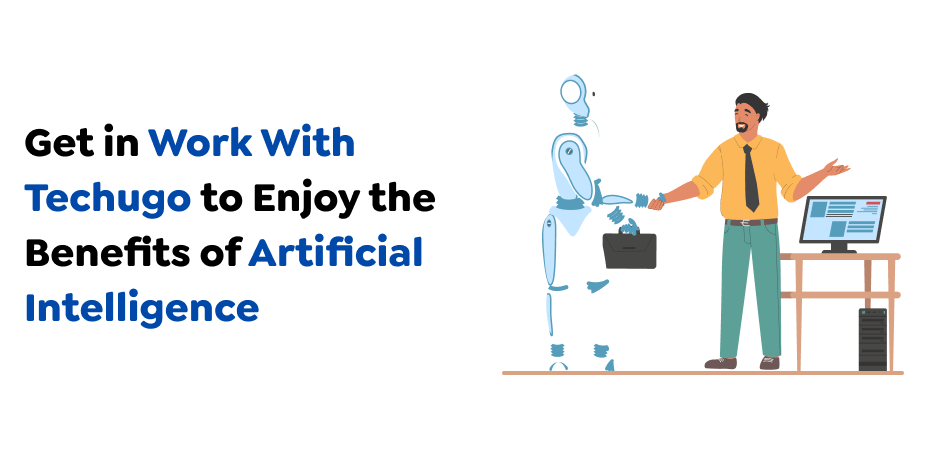
In the final analysis, how AI is transforming digital marketing creates a new path, bringing new possibilities where efficiency, innovation, and value creation are the keys to transforming the business landscape. The convergence alters how businesses operate as they make decisions and create results. This is more than improvements in productivity and efficiency. It’s about changing and transforming how the value is shared.
The efficient interplay of AI and business operations allows you to understand the challenges of modern-day business and adapt to its continuous changes that present new opportunities and challenges for customer experience, as well as the management of data and its analysis. With the aid of AI, businesses can look forward to an age of enduring and exciting growth rates by looking for more opportunities for synergies, solving the issues of implementation, and maximizing the potential of these applications and the upcoming digitalization of business.
Techugo emerges as the ideal partner in this era of AI-driven digital transformation. With a proven track record of delivering innovative AI solutions, Techugo possesses the expertise to guide businesses through the complexities of AI integration. Our team of skilled professionals understands the nuances of AI technology and can tailor solutions to meet specific business objectives. By partnering with Techugo, businesses can leverage AI’s potential to enhance operational efficiency, improve customer experiences, and unlock new opportunities for growth in the competitive digital landscape.
Let’s discuss your AI project! Get in touch with Techugo today.
Write Us
sales@techugo.comOr fill this form